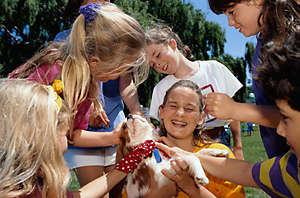
 |
|
 A pet is a true member of the American family. Did you know that about 60% of American households have at least one dog, cat, bird, or other companion animal? Pets provide companionship, joy, unconditional love, a sense of safety, and often a service. These are probably some of the reasons why you're thinking about getting a pet. Animals are fun to be with every day. Pets make people feel good. But the pet-owning experience will be most enjoyable if you take the time to consider which animal best suits your wants and needs. Start by answering some easy questions and gathering sound information and advice. This process won't take long and it will be educational and fun, particularly for children. Take time, involve the family, and answer the following questions first: Do You Have Room for a Pet? Active dogs need more space and more daily exercise than older or more sedentary dogs. Some pets may get enough exercise within the confines of a house or apartment. Most animals are better kept indoors or in a suitable kennel while you're gone. Cats, birds, and small mammals can adapt to any size living quarters. What Activities Do You Enjoy? Will the animal you're considering have the temperament and physical attributes to participate in your outdoor activities (hiking, hunting, or camping) or in quiet pastimes at home? If your leisure activities take you away from home, who will care for your pet during your absences? Read about the temperaments and needs of species and breeds, and identify those that best match your lifestyle. How Do You Spend Your Day? Pets depend on people for daily affection and attention. Young puppies and kittens require time for housebreaking, training, and feeding. Are you gone all day? Do you frequently work late? What will you do with your pet during long absences? Feeding, exercise, grooming, and play are daily time commitments that must be considered in caring for a healthy, happy pet. Do You Have No-Pet Clauses? Your lease or condominium association rules may prohibit dogs and cats, but you can ask for a waiver. Outline your plan to care for your pet, to adapt to your living environment, and to meet your landlord's expectations. Assure your association leaders that you are a responsible pet owner who is aware of the importance of a well-behaved animal and a clean environment. Agree in writing to pay a refundable deposit or a small monthly surcharge. How Much Will Your Pet Cost? This varies greatly. All pets need food and shelter, and most should have regular visits to a veterinarian for health checkups and vaccinations. Other cost considerations include emergency medical treatment, grooming, boarding, licensing, obedience training, and accessories. Pet health insurance for unexpected illnesses or injuries is available in many states. Veterinarians and Other Community Resources A good place to start finding a pet is a family consultation with a veterinarian to determine the compatibility of your needs with those of the pet being considered. Veterinarians can offer expert advice on the physical needs, health, and behavioral characteristics of animals, and can direct you to other resources. You can also look in public libraries, humane societies, animal shelters, animal-control agencies, breeders, pet stores, obedience classes, and local kennel, cat, and bird clubs. Avoid the Unwanted Pet! Don't let the playful antics of the first puppy, kitten, or bird you see charm you into accepting a responsibility for which you are not prepared. You've read articles about the millions of unwanted pets that have to be put to death each year. Pets selected on impulse, for the kids, or as a gift during the holidays sometimes end up this way. Involve the Family Selecting a pet should be a family project with everyone's needs, concerns, fears, and medical history (including allergies) considered. Family members should decide together what kind of animal they want, the amount of time they anticipate spending with it, and the amount of responsibility each person is willing to assume. Be realistic. Promises from some family members, particularly children, may not be fulfilled. Get a Checkup The neighbor, breeder, shelter, or pet store where obtain your pet should allow you to have the animal examined by a veterinarian and to return it within an agreed-upon time if the animal is unhealthy. Do this as soon as possible, before you become emotionally attached to the animal. Prepare Your Home for Your Pet's Arrival Make a special place for it to eat and sleep. Try to maintain the animal's daily schedule for play, eating, and elimination. Decide where you will exercise your pet. Obtain any necessary accessories (such as collar and ID tag, leash, scratching post, litter box, crate, bird cage, etc.) before you bring your pet home. You should pet-proof your home just as you would child proof your home to avoid accidents. Harmful cleansers, plants, electrical cords, and breakable objects should be put out of reach. |
|
 Picking a Dog  Picking a Cat  Picking a Bird  Picking Exotics |